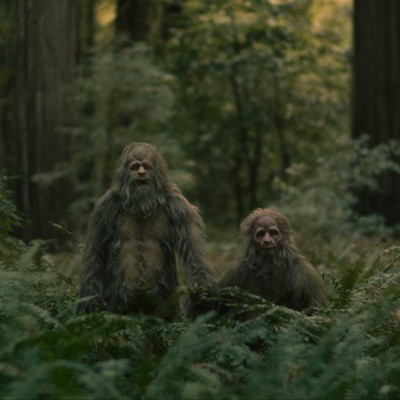What was the name of that other boxing movie? Million Dollar something? Sorry, no disrespect meant, and that was one of my favorites of last year. But this newest entry in the pugilism genre is the better of the two. In the ever-capable hands of Ron Howard, it's presented as a good old-fashioned Hollywood movie. And this time out, he's much more than capable at it; he's made one of the best films of his career.
It's the true story of James J. Braddock, an Irish scrapper in New Jersey who, despite an accident-prone pair of hands -- they were too weak for the fight game and were regularly broken -- worked his way up through the boxing ranks and won over the cheers of crowds in Depression-era America.
As played by Russell Crowe, with whom Howard worked wonders in A Beautiful Mind, Braddock comes across as an Everyman who, like so many others in his day, was having trouble eking out a living for himself and his family. The film shows times when his kids were still so hungry after a meager dinner, Braddock gave them his own, even though he had to go out and fight that night.
To hammer home the desperate situation, the film opens in 1928, before the stock market crash, when Braddock dressed well, had a little money to burn and lived the good life. Even his manager, Joe Gould (Paul Giamatti) was enjoying a bit of luxury. Then the action almost cruelly jumps ahead to 1933, when, hard-pressed along with the rest of the populace to find any kind of work, Braddock would settle for $50 pick-up fights.
Howard brings forth an excellent recreation of the times: the frowns on endless faces; a quick glimpse of a newspaper with the headline "15 million unemployed"; kids getting their drinking water from a fire hydrant; a defeated man simply walking away -- forever-- from his sobbing wife.
But in the finest Frank Capra tradition, Howard and his writers show Braddock as a man with hope, a loving wife (Renee Zellweger) and adoring kids. There's just no way not to root for the guy. After a ton of bad luck, he gets a chance out of the blue, at Madison Square Garden -- because his manager still believes in him -- against John "Corn" Griffin. It's the first moment (the first of many) when it's plain to see how far along Crowe has come as an actor. It happens quickly, but look for the reaction on his face when he walks into the Garden -- the Garden! -- recognizing and loving the adulation from the crowd. All without saying a word.
It's also the first of many fights -- most of which are grueling, every one of which is terrifically structured by Howard, whether he's focusing on editing, camera angles, camera movements, corner pep talks or the animated announcer.
But there's so much more to the film than the fights. Braddock has problems with the boxing commission (headed by Bruce McGill in a real class act) because of the condition of his hands. His wife starts to lose her emotional grip concerning the dangers of the business. And there's the specter of world champion Max Baer (Craig Bierko, in yet another of the film's great performances) hanging over him. If Braddock is the common man here, then Baer is bigger than life -- a loudmouth, swaggering womanizer with tremendous talent in the ring.
And he's a character to be feared. A sequence of Braddock watching a film of Baer actually killing a man in a fight triggers his imagination, and his mind "sees" the big brute coming for him. It's an outstanding piece of direction -- not only visually inventive, but also a superb example of getting inside the heads of two characters at once.
So what we've got here is a film worthy of many Oscar nominations: director, film, script, and supporting actor (for Giamatti). Crowe's measured, solid, stoic portrayal is excellent, but just short of Oscar material.
Fans of Howard know that little brother Clint is in all of his films. He shows up here as a referee in the Braddock-Abe Feldman fight. But fans of boxing and movies will get their biggest treat during the Braddock-Baer matchup of June 13, 1935, when they competed in a brutal, heart-pounding fight in the huge Madison Square Garden Bowl in Queens. The boxers smiled and grimaced; their punches were as loud as the raucous crowd. If you know your boxing history, you know who won. If not, please stay away from Google. You don't want to learn the results beforehand. The ending of the film is as great as the two-plus hours that lead up to it.















